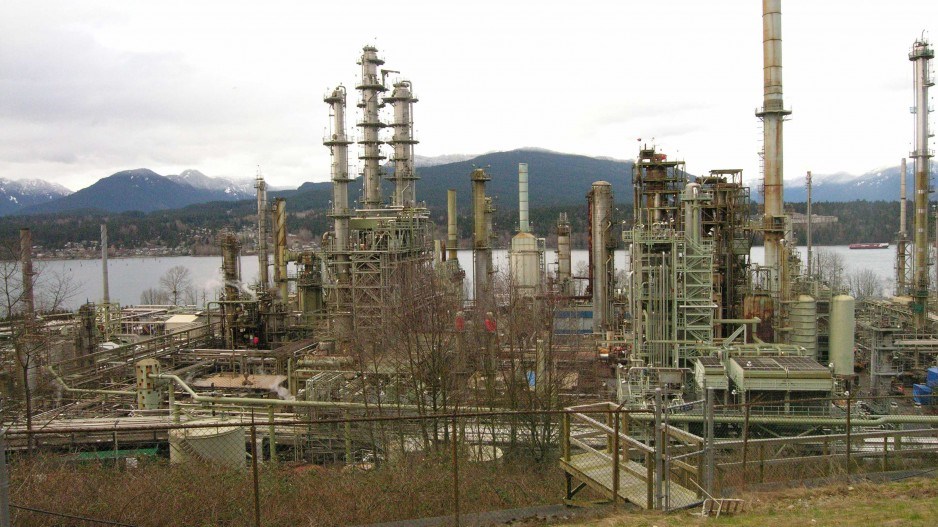As expected, President Barack Obama last week vetoed TransCanada’s (TSX:TRP) proposed Keystone XL pipeline from Alberta to Nebraska. And that could mean stiffer competition for Trans Mountain oil once the pipeline is expanded.
Whether other new pipelines get built is just one of the wild cards in a pipeline paradox that could leave the Chevron (NYSE:CVX) refinery in Burnaby no better off than it is now, despite a tripling of the Trans Mountain pipeline’s capacity.
The Chevron refinery currently gets only a small fraction of the oil that moves on the Trans Mountain pipeline. The rest goes to U.S. markets via a spurline that splits off at Abbotsford, running to Washington state or by tanker via the Westridge Marine Terminal.
In recent years, Chevron has increasingly relied on shipments of oil by rail to augment supply of the 55,000 barrels it needs each day because of limited capacity from the Trans Mountain pipeline – up to 10,000 barrels per day.
Tripling Trans Mountain’s daily capacity to 890,000 barrels from 300,000 is no guarantee that things will improve for the Chevron refinery.
Robyn Allan, an economist who has scrutinized the Trans Mountain pipeline expansion plans, said the expansion might yield no net benefit for the refinery or its B.C. customers.
Chevron, she said, might have to continue – or even increase – its use of oil by rail to supplement its needs.
But that cost is about to rise, thanks to new federal insurance requirements that will add approximately $0.25 to each barrel of oil shipped by rail.
But the cost of buying oil from the Trans Canada pipeline is expected to nearly double to $5 per barrel from $2.71 after the $5.4 billion expansion that Kinder Morgan Inc. (NYSE:KMI) is planning.
“If it costs you $5 per barrel to ship it by pipeline, and you’ve already got your rail in place, why would you pay more to ship it by pipeline after the expansion?” said Allan, who was one of the interveners in the National Energy Board’s (NEB) review of the expansion proposal.
“There is no guarantee of access for domestic refineries to our crude oil out of Alberta. And barrel-for-barrel cost of pipeline delivery on Trans Mountain, after the expansion, will be about twice as much for Chevron than before it.”
Chevron appears to be ambivalent about the expansion. On one hand, it’s in the oil and gas business, with both refining and extraction operations, and generally supports improving market access for Alberta oil through the Trans Mountain pipeline expansion.
But since 2010, its oil allocation from the pipeline has shrunk, forcing it to invest in its rail infrastructure to increase shipments by rail.
It’s still unclear whether the Burnaby refinery will have better access to oil following the Trans Mountain expansion.
Kinder Morgan Canada president Ian Anderson insists it will.
“I would say, overall, the availability and certainty of space for Chevron goes up with expansion, notwithstanding the fact the total spot available is less,” Anderson said.
Dave Schick, Chevron’s manager of policy, government and public affairs, said there are many variables at play.
“Is it a benefit or not? We like the diversity of supply. We support infrastructure for our business in general. But whether or not, when it’s built – if it’s built – five years from now, it’s hard to say what the impacts are going to be.”
Of the expanded pipeline’s daily 890,000-barrel capacity, 708,000 barrels are spoken for – committed to 13 companies on long-term take-or-pay contracts.
Chevron is not among the companies with long-term off-take commitments.
Chevron will therefore have to bid monthly on the 180,000 barrels per day left over for the spot market, which is less than what’s currently available.
Some of the companies that have signed long-term commitments might no longer need to bid on the oil set aside for spot markets, but there is no guarantee they won’t.
One of the variables is whether other pipelines get built.
“If you have several pipelines to choose from, you’re going to choose which is the cheapest,” said Werner Antweiler, an associate professor of economics at the University of British Columbia Sauder School of Business.
If the Keystone XL is never built, there could be heavier competition for oil from the Trans Mountain pipeline in the U.S.
Another variable is the type of oil moved through the pipeline.
Some refineries are designed to refine bitumen from the Alberta oilsands; others, like Chevron’s Burnaby refinery, can process only sweet light crude. Schick said he’s not sure what the mix will be.
“When you make such a fundamental shift to the market, when you triple the size of that pipeline, it becomes a whole different ball game, and it’s really not clear exactly how it’s going to impact us.”
Chevron had applied for a priority destination, which would give it a set-aside – based on the principle that there should be some local benefits to the pipeline expansion. The NEB rejected that request.
Dave Moffat, president of Unifor, the union representing Chevron refinery workers, worries that the expansion might not provide a net benefit to British Columbians.
The union is worried about the refinery’s future.
“We’re very concerned about the maintenance of jobs in that community and the ability to survive at the additional costs that are going to be borne by the competitive markets,” he said. “It puts the facility at risk."
With files from Jennifer Moreau, Burnaby Now



